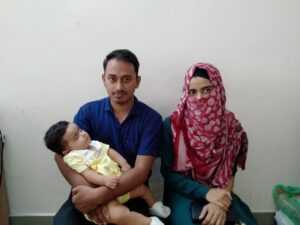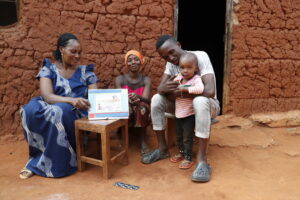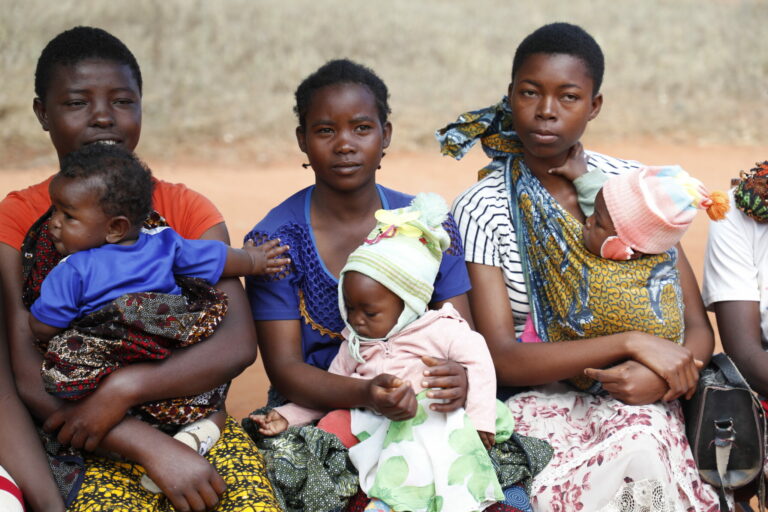Millions of adolescent girls and young women continue to begin childbearing early. The transition to becoming a mother for the first time is one of the most significant changes in a young woman’s life and brings many challenges and risks. Young mothers experience social and gender barriers that limit their access to and use of reproductive, maternal, newborn, and child health (RMNCH) services, including postpartum family planning (PPFP) and postnatal care (PNC). Evidence increasingly shows that this period also provides a window of opportunity to support first-time mothers (FTMs) to adopt behaviors and equitable practices.
Despite a growing body of interventions targeting FTMs, few efforts have expanded beyond small pilot areas. Often, scale-up efforts are hindered by limited platforms for deep intervention with FTMs and their families. Like many complex initiatives, holistic approaches have struggled to maintain quality and intensity without donor funding.
Save the Children, in partnership with the George Washington University Milken School of Public Health and with grant support from the Bill & Melinda Gates Foundation, leads the Connect project in Bangladesh and Tanzania. Connect develops, tests, and scales sustainable approaches to improve PPFP and PNC use among FTMs.
What could scalable FTM approaches look like?
In 2020, we drew from formative work and a systems-informed design process to design scalable community and facility-based approaches that address the FTM’s needs and key barriers to PPFP and PNC use. We designed the approaches—which we call “enhancements”—to be as light-touch as possible and integrated into existing government platforms and tools wherever feasible.

In Bangladesh, Connect supports a paid community health worker (CHW) cadre to prioritize postnatal home visits to mother-baby dyads identified to have risk factors—including mothers who are younger than 20 years old and an FTM. CHWs provide PPFP and PNC counseling that engages family members where feasible. CHWs also distribute a mother-baby booklet written for FTMs and husbands, along with a printed invitation card inviting FTMs to access RMNCH services from the closest health facility. At the facility level, FTMs receive antenatal care counseling that encourages facility delivery and use of PNC and PPFP. Mothers delivering in facilities receive pre-discharge counseling using a checklist that includes a risk assessment and outlines all the services that should be provided before discharge.
In Tanzania, Connect “enhanced” existing nutrition community support groups led by CHWs for pregnant and breastfeeding mothers to increase the enrolment of FTMs, and to include four PPFP-focused activities. The CHWs also counsel FTMs at home, using an integrated nutrition/PPFP job aid. During visits, CHWs engage FTMs’ families when possible, and provide short-acting PPFP methods and facility referrals for other methods. At the facility level, Connect supported the government to introduce an on-the-job respectful care training to mitigate harsh and judgmental treatment.
Enhancements required trade-offs for scalability. Notably, while the importance of engaging FTMs’ male partners and mothers-in-law is well-documented, we found no existing government platforms in Bangladesh nor Tanzania to engage these family members; this limited our ability to intervene as intensively with families as we would have wanted.
In 2021, we supported government and local partners to introduce the enhancements in small geographic areas. We gathered feedback from FTMs, their families, and frontline implementers, and conducted two FTM surveys to assess the enhancements’ effectiveness, acceptability, and feasibility, to identify refinements needed to the approaches and to inform scale-up plans.
What did we learn about scalable FTM approaches?
Despite trade-offs for scalability, survey findings from Bangladesh and Tanzania found that the light-touch enhancements showed potential for impact. Notably, the enhancements were associated with changes in key outcomes:
- Improved modern PPFP use
-
- 77.7% of Bangladeshi FTMs reported adopting a modern method – an increase from 29.9% at baseline
- 64.0% of Tanzanian FTMs reported adopting a modern method – an increase from 42.4% at baseline
- Improved PNC use for mother and baby (Bangladesh only)
-
- PNC visits for FTMs went up to 65.4% compared to 46.1% at baseline
- PNC visits for babies increased to 67% compared to 51.1% at baseline
- Increased couple communication around PPFP
-
- 87.4% of Bangladeshi FTMs reported discussing PPFP with their male partner, a 65% increase
-
- 83.6% of Tanzanian FTMs reported discussing PPFP with their male partner, an 18% increase
- Improved family planning self-efficacy (how confident FTMs felt in their ability to discuss, access and adopt FP, and to continue FP use) in both settings.
What are our next steps?
Two new technical briefs detail the findings for Bangladesh and Tanzania, and provide more information about the enhancements. You can also read summaries from findings in Bangladesh and Tanzania in the project factsheets. Other resources can be found here.
Despite trade-offs for scalability, findings from our light-touch efforts are encouraging. Our team is moving forward with scaling the enhancements across more geographic areas, coupled with qualitative and quantitative evaluations. As a field, we need to continue to seek a balance between designing for scale—with streamlined approaches that enhance government platforms—and designing for impact—with approaches that address FTMs’ unique needs.
Contact Information
Melanie Yahner, Senior ASRH Advisor, Save the Children, Connect Project Lead
myahner@savechildren.org
Photo credit: Save the Children
